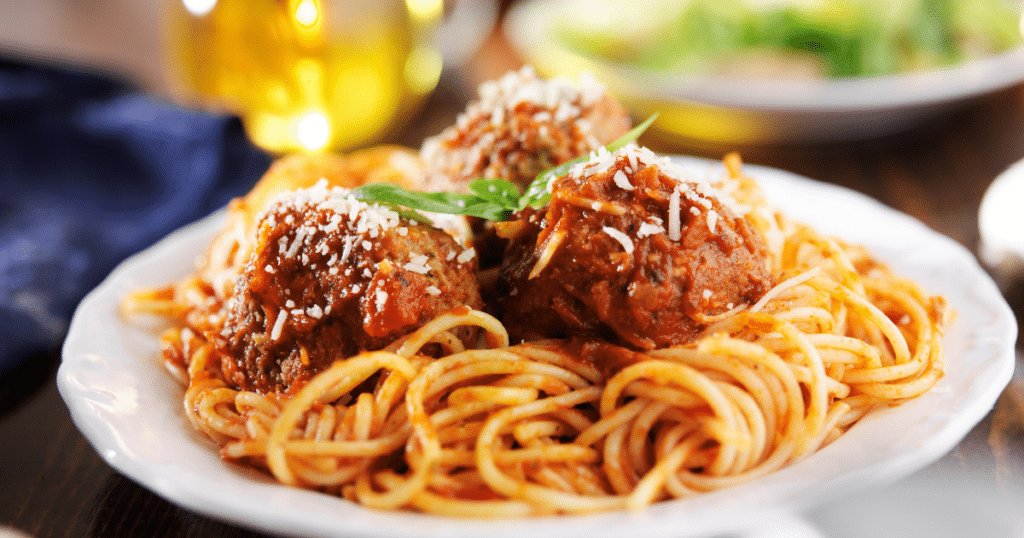Level Up Your Nutrition Game With Our Freebies
Alex
I provide nutrition coaching for endurance athletes to improve performance and body composition through a simple and flexible eating style.
Hi, I'm
ATHLETE EATING GUIDE →
LEARN MORE →
ATHLETE GROCERY SHOPPING GUIDE →
10-DAY PROTEIN-PACKED SAMPLE MEAL PLAN
READY TO FUEL?
incredible value!
The fueling guide bundle serves as your one-stop-shop for strategies to fueling before, during and after your workouts.
Nutrition plays an important role in preparing for a half marathon, serving as premium fuel for optimal performance and recovery. A well-rounded nutrition plan tailored to your training regimen can maximize your potential and help you conquer the miles ahead. Let’s review a half-marathon nutrition plan that will be your key to success throughout training and heading into race day!
Balanced Nutrition When Training for a Half Marathon

Popular fad diets are not ideal for nutrition performance. Remember that performance nutrition should be sustainable and not restrictive. Focus on taking a balanced and sustainable approach to your nutrition without cutting out any major food groups.
Ideally, when planning your athlete meals and snacks to fuel your training, you want to include the right foods so that you make it to the race start. Let’s walk through the key features of those food choices.
Carbohydrates
Carbohydrates are premium fuel when it comes to filling your nutrition tank because carbohydrates are the most efficient source of energy.
When you consume carbohydrates, your body breaks it down into glucose (sugar). Glucose will be used for upcoming exercise or converted into muscle glycogen to be stored and used later. Typically, most runners require at least 55% of their calorie intake from carbohydrates. However, this can vary based on factors such as duration and intensity of run and carbohydrate-loading for an upcoming race. It is important to recognize that not all carbohydrates are the same. During training, you will consume both simple and complex carbohydrates for fuel.
Simple carbohydrates
Simple carbs are easy to digest and are found in candy, sweetened beverages, desserts and other foods with added sugar, energy gels, energy or sports drinks. Foods high in simple carbohydrates will break down quickly to be used as energy.
Complex carbohydrates
Complex carbs take longer to digest. These are found in higher-fiber, nutrient-dense foods. Such as, whole grains (barley, brown rice, quinoa, oats), legumes including beans and lentils, and starchy vegetables such as sweet potatoes and potatoes. These foods are excellent to include throughout the day in meals and snacks to boost your vitamin and mineral intake and help keep you feeling satisfied.
Protein
Research supports that adequate protein in endurance athletes speeds up muscle recovery and offsets muscle damage.
Most endurance athletes will benefit from 1.2-2.0g of protein per kilogram of body weight, which should be spaced throughout the day. Lean protein-rich food sources to include regularly include poultry, fish, beef, pork, eggs, dairy including Greek yogurt and cottage cheese, tofu, tempeh, seitan, edamame, beans and lentils, protein bars, and protein powder supplements. Most athletes fall short of their protein targets, but meeting those needs doesn’t need to be overcomplicated.
If you are constantly falling short of meeting your protein needs, consider topping your toast with an egg (or two), adding a scoop of low-fat cottage cheese or Greek yogurt with your fruit smoothie, or making trail mix with dried edamame, pumpkin seeds, and pretzels.
Healthy Fats
Adequate dietary fat intake provides your body enough fuel for training, helps with vitamin absorption, and decreases inflammation.
About ~20-30% of your diet should include healthy fat sources such as olive oil, nuts and seeds, olives, and avocado. Flaxseed, chia seed, and walnuts are extremely rich sources of omega-3 fatty acids. Research shows that regular consumption of omega-3s can help reduce inflammation from training demands
Fruits and Vegetables
Aiming for at least five servings of fruits and vegetables per day is ideal. I encourage athletes to focus on a wide variety of produce to get in a spectrum of vitamins and minerals.
Fresh doesn’t always need to be the focus. Stocking your pantry and freezer with canned and frozen options can be an easy, convenient, time-saving method. Here are some great strategies to sneak in produce:
- Topping your Greek yogurt with berries
- Adding sautéed spinach and peppers to your morning eggs
- Enjoying a mid-day fruit and spinach smoothie
- Sliced apples drizzled with almond butter
Fruits and vegetables are extremely rich in dietary fiber so if you are prone to gastrointestinal issues during your runs, choosing well-cooked lower-fiber vegetables and fruits may be a strategy to help lessen the unwanted side effects.
What to Eat Before a Half Marathon

You’ve fueled well throughout your training cycle and now have made it to the home stretch! To fuel your body best for race day, you must consider your nutrition intake before the start of the race. This includes your carbohydrate loading plan and food choices the evening before your race.
What To Eat The Night Before A Half Marathon
Similar to carb loading, consider experimenting with your standard pre-race meal on the evenings before your longest long runs to ensure your body tolerates the meal. This will help increase confidence in your food choices heading into race day. A carbohydrate-rich meal that is lower in fat and fiber with extra salt is typically best to focus on. Here are a few examples of what to eat the night before a marathon:
- Vegetarian sushi with soy sauce, an extra side of white rice and an applesauce pouch. Applesauce pouches are a lower-fiber alternative to fresh apple slices.
- Low-fiber spaghetti noodles with ground turkey marinara and a breadstick. Consider swapping your usual whole wheat pasta for regular white flour pasta noodles.
- “Breakfast for dinner” with pancakes and maple syrup, orange slices and apple juice. This does not need to be homemade pancakes as certainly there are many low-fiber boxed pancake mixes available at the grocery store. French toast and waffles are great options as well!
- Baked salmon with salted boiled potatoes and banana slices. Teriyaki or soy sauce are great high-sodium flavorings to jazz up this dish.
- Grilled chicken tacos with corn tortillas and an extra side of white rice. Remember to pass on the side of refried beans!
- If traveling- tuna packet with microwavable rice and fruit juice. Salmon packets are a favorite go-to travel essential as well.
- If dining out- grilled chicken with a baked potato, a dinner roll and a glass of lemonade. Other high-carbohydrate options to look for a la carte are naan, white rice, white pasta, and bread.

What to Eat The Morning of a Half Marathon
Each individual is very different in what foods work well on race day morning but the parameters of what to include are generally the same. At least 2 hours before the race start, you want to optimize carbohydrate, sodium, and fluid intake. If your body requires more time to digest the meal adequately, setting an early alarm at least 3 hours before the start of the race may be necessary to simply allow more time. Morning meal ideas to consider include:
- Cream of rice cereal with maple syrup and Skratch hydration beverage
- Toast with salted almond butter and honey and Tailwind hydration beverage
- Baked oatmeal with sliced bananas and a glass of apple juice
- Pre-made pancakes topped with maple syrup and juice mixed with UCAN
- If traveling- brown sugar oatmeal packet with an applesauce pouch and Skratch hydration beverage
- If you are eating hotel breakfast- low-fiber bagel with peanut butter and jelly, a banana, and a glass of orange juice
Half Marathon Nutrition Plan: Intra-Race Strategies

There is no one-size-fits-all approach when it comes to your half marathon nutrition plan as each athlete has unique needs. However, for many of our successful endurance athletes, we strive for the following targets:
- Prioritize carbs. Aim for 60-90 g of carbohydrates per hour while training or racing, 200-500 mg of sodium per hour, though potentially more if you’re a salty sweater. Your electrolyte needs will vary based on your body size, intensity, duration of the run or race, and the weather.
- Aim for at least 5-10 oz of fluids every 15 minutes during your training session or race. However, it is best to know your sweat rate in varying weather conditions so you can tailor your exact hydration plan accordingly.
- Simple carbohydrates and easy-to-digest starches such as energy gels and sports drink beverages are the most convenient options for hitting these nutrition goals. Consider experimenting with a wide range of sports nutrition products to see what your body tolerates in varying weather conditions. GU, PowerBar Sport, SIS, Spring Energy, Maurten, Tailwind, and Skratch are many common options available but certainly, this is not an exhaustive list. If you are feeling overwhelmed simply looking at this list, consider working with a sports dietitian to better identify which product(s) work best for you.
Recovery Nutrition Post-Race
When your race ends, recovery begins! Races are hard as you push the envelope on your body’s capabilities. Central nervous system fatigue, inflammation, elevated core temperature, electrolyte disturbances, and depleted glycogen are just a few of the physiological processes that occur after a half marathon. The importance of recovery nutrition after a half marathon is important to jump-start recovery. Be sure to visit our blog post on maximizing recovery nutrition.
Half Marathon Nutrition Plan: Practice Again and Again
As you are logging those miles away, it is important to practice your half marathon nutrition plan over and over. This will only provide you with the much-needed confidence heading into race day. For individualized guidance and support on fueling your training and ultimately your race, reach out and let’s talk about 1:1 nutrition coaching. We provide personalized accountability and strive to teach you how to create a sustainable and flexible eating style to meet your needs as a runner.
Alex
I provide nutrition coaching for endurance athletes to improve performance and body composition through a simple and flexible eating style.
Hi, I'm
LEARN MORE →
take the quiz!
Let's discover your Endurance Nutrition IQ
How well do you know your fueling? Answer these questions and let's see where your endurance nutrition knowledge is at!
Take the quiz
level up your nutrition game with these freebies
free downloadS
Protein-Packed 10-Day Sample Meal Plan
Athlete Eating Guide
Athlete Grocery Shopping Guide
1
2
3
Inspiration to fit 120 grams of protein into your day
Planning what goes on your plate
Putting the right foods in your grocery cart
